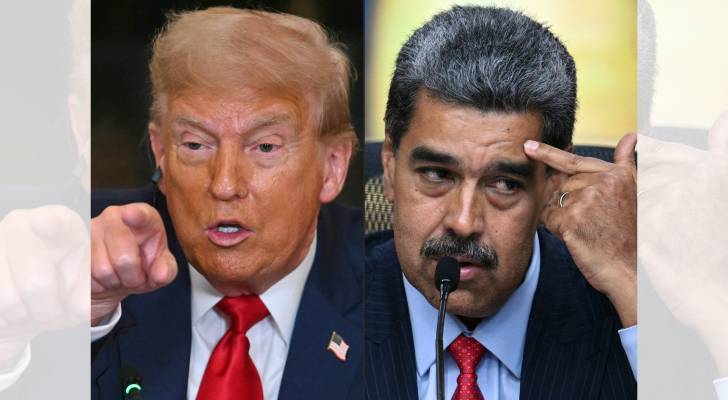US President Donald Trump, and Venezuelan President Nicolas Maduro.
$50 million: US doubles bounty on Venezuela's Maduro
The United States on Thursday doubled its bounty on Venezuelan President Nicolas Maduro -- who faces federal drug trafficking charges -- to $50 million.
"Today, @TheJusticeDept and @StateDept are announcing a $50 MILLION REWARD for information leading to the arrest of Nicolas Maduro," Attorney General Pam Bondi said in a social media post.
The previous bounty was set in January at $25 million.
Caracas was quick to condemn the US decision, calling it "pathetic" and "ridiculous."
Venezuelan Foreign Minister Yvan Gil wrote in a statement, "This pathetic 'reward'… is the most ridiculous smokescreen we have ever seen."
"The pathetic 'bounty'... is the most ridiculous smokescreen we have ever seen," Venezuelan Foreign Minister Yvan Gil said in a statement on Telegram, hours after US Attorney General Pam Bondi announced the increase.
On Jan. 10, days before President Donald Trump's inauguration, the administration of former President Joe Biden had condemned Maduro's re-election as "illegitimate."
At that time, the Departments of State and Treasury imposed new sanctions on Caracas and raised the reward for Maduro's capture from $15 million to $25 million.
The financial reward is for information that helps the United States capture and prosecute the Venezuelan president on charges of "drugs and corruption." These charges, which include participation and conspiracy in international "drug trafficking," date back to 2020 at the end of Trump's first term.
The US Department of Justice and the Federal Prosecutor's Office in New York accuse Maduro of being behind a cartel believed to have sent hundreds of tons of drugs to the United States over two decades, valued at hundreds of millions of dollars.
On Thursday evening, the US Attorney General affirmed that American authorities suspect this cartel is cooperating with the Revolutionary Armed Forces of Colombia (FARC), which Washington considers a "terrorist" organization.
The attorney general also accused the Venezuelan president of cooperating with the Venezuelan gang "Tren de Aragua" and the Mexican "Sinaloa" cartel.




